Reach for the Top Class 9 Extra Questions and Answers CBSE English Chapter 8 NCERT Beehive– Extract Based Questions MCQs Short Answer Questions Long Answer Questions and Value Based Questions
REACH FOR THE TOP
(Extra Questions)
Part I
Santosh Yadav
Extract Based Questions
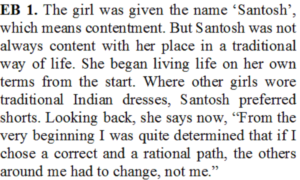

(i) Which word in the extract mean ‘contentment’?
(ii) How did Santosh begin living her life?
(iii) What did Santosh prefer to wear?
(iv) Whom did Santosh expect to change?
(v) Which word in the extract mean ‘selected’?
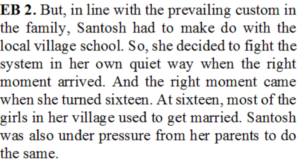

(i) Where did Santosh study?
(ii) Why did Santosh not oppose going to village school?
(iii) At what age girls of the village used to get married?
(iv) Who pressurized Santosh to get married?
(v) Which word as used in the extract mean ‘existing’?
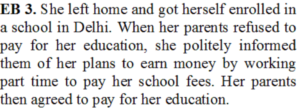

(i) To whom does the word ‘she’ refer to in above extract?
(ii) What did ‘her parents’ refuse?
(iii) How did ‘she’ plan to pay for paying for her school fees?
(iv) Eventually who paid for ‘her’ education?
(v) Which word in the extract is antonym of ‘rudely’?
(vi) In which city ‘she’ took admission in a school?
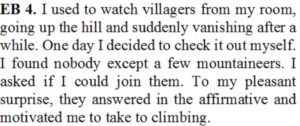

(i) Who used to walk up the hill?
(ii) To whom does the word ‘I’ refer to in above extract?
(iii) Whom did ‘I’ find at the hills?
(iv) Which words in the extract imply giving permission?
(v) Which word in the extract mean ‘disappearing’?
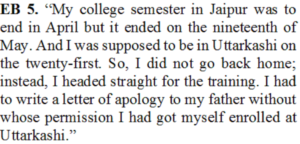

(i) When did the semester actually end?
(ii) When was ‘I’ required to reach Uttarkashi?
(iii) Which group of words as used in the extract mean ‘directly went’?
(iv) Whose permission ‘I’ had not taken?
(v) How did ‘I’ apologize to her father?
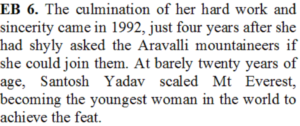

(i) In which year Santosh climbed Mount Everest?
(ii) In which year Santosh had met mountaineers at Aravalli?
(iii) What was the age of Santosh when she climbed Mount Everest?
(iv) What record Santosh set when she reached Mount Everest?
(v) Which word in the extract mean ‘reached?
(vi) Which word in the extract mean ‘highest reward?
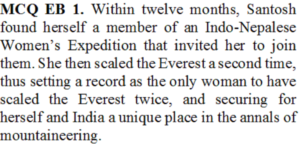

(i) The team had people from which countries?
(a) India and Burma
(b) Indonesia, India and Nepal
(c) India and Nepal
(d) None of above
(ii) This time Santosh scaled the mountain for
(a) first time
(b) second time
(c) third time
(d) fourth time
(iii) What unique feat Santosh achieved this time?
(a) She became the only woman to reach Mount Everest alone
(b) She became the only woman to reach Mount Everest twice
(c) She became the youngest woman to reach Mount Everest
(d) All the above
(iv) Based on the extract please classify following as fact and opinion
1. Santosh scaled Mount Everest for the second time within 12 months
2. This time the team was an all-women team
3. Santosh secured a unique place in records of mountaineering
4. Santosh must have been a proud person
(a) F -1,2 and O -3,4
(b) F- 1,4 and O- 2,3
(c) F – 2,3 and O – 1,4
(d) F – 1,3 and O – 2,4
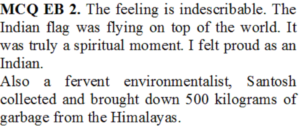

(i) In above extract which feeling is referred as indescribable?
(a) Unfurling the Indian flag
(b) Being on top of the world
(c) Feeling of a proud Indian
(d) Both (a) or (b)
(ii) Santosh took pride in being
(a) woman
(b) environmentalist
(c) mountaineer
(d) Indian
(iii) What did Santosh bring down from the Himalayas?
(a) pleasure
(b) ice
(c) pride
(d) garbage
(iv) Which word as used in the extract is synonym of ‘keen?
(a) spiritual
(b) proud
(c) fervent
(d) indescribable
Short Answer Questions (30-40 words)


















Long Answer questions (100-120 words)


She had said that if she selected a correct and rational path, then others need to change not me.
She did not follow the tradition of the village to get married around 16 years of age. She enrolled herself in a school at Delhi. She decided to do part time job when her parents refused to pay for her education. Eventually her parents paid for her education. Later she studied at Maharani College, Jaipur. She took mountaineering training at an institute at Uttarkashi.
Thus we can see that Santosh did not follow traditional ways of society. She lived her life on her own terms.


She improved her climbing skills. She developed an extraordinary resistance to cold and altitude.
Her seniors used to marvel at her climbing skills, physical endurance and mental toughness. Her colleagues used to appreciate her for her concern for others and willingness to work in a team.
Hence Santosh had all the qualities of an excellent mountaineer.
****
Part II
Maria Sharapova
Extract Based Questions
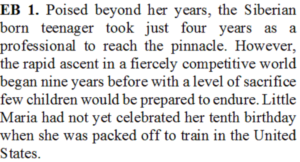

(i) Which word in the extract mean ‘quick’?
(ii) What was the age of Maria when she shifted to United States?
(iii) Why did she go to United States?
(iv) Where was Maria born?
(v) Which word in the extract mean ‘peak?
(vi) How much time Maria took to reach the pinnacle?
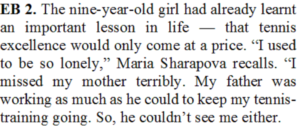

(i) What lesson did Maria learn at young age?
(ii) Which sport did Maria play?
(iii) Whom did Maria miss most?
(iv) Why her father could not come to meet her?
(v) Which word as used in the extract mean ‘also’?
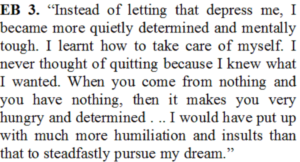

(i) To whom does the word ‘I’ refer to in above extract?
(ii) Why did the narrator not think of quitting?
(iii) When is one very hungry and determined?
(iv) The narrator was ready to tolerate
(v) Which word in the extract is synonym of ‘allowing?
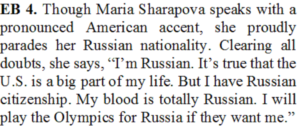

(i) Maria’s accent is
(ii) Which is native country of Maria?
(iii) For which country Maria wants to play Olympics?
(iv) Which country is a big part of life of Maria?
(v) Which word in the extract is antonym of ‘humbly?
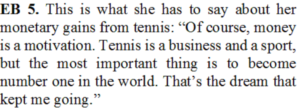

(i) Who is narrator of above extract?
(ii) Narrator describes tennis as which two categories?
(iii) What according to narrator is the most important thing?
(iv) What does the narrator describe as motivation?
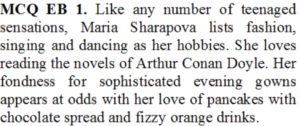

(i) Which of the following is not hobby of Maria?
(a) fashion
(b) dancing
(c) writing
(d) singing
(ii) Maria loves reading
(a) poem
(b) prose
(c) novel
(d) scriptures
(iii) Her fondness to which item is at odds with her taste?
(a) fashion
(b) evening gown
(c) novel
(d) both (a) and (c)
(iv) Based on the extract please classify following as fact and opinion
1. Maria likes reading novels
2. Maria should have different hobbies
3. Pancakes are favourite of Maria
4. All gowns of Maria could be sophisticated
(a) F -1,2 and O -3,4
(b) F- 1,4 and O- 2,3
(c) F – 2,3 and O – 1,4
(d) F – 1,3 and O – 2,4
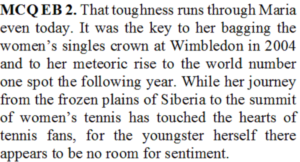

(i) What does Maria possess even today?
(a) Pleasantness
(b) Toughness
(c) Sentiments
(d) Both (a) or (b)
(ii) In which year Maria became world number one?
(a) 2003
(b) 2004
(c) 2005
(d) 2006
(iii) What does Maria not care for?
(a) spirituality
(b) crown
(c) sentiment
(d) room
(iv) Which word as used in the extract is synonym of ‘peak?
(a) meteoric
(b) key
(c) summit
(d) journey
Short Answer Questions (30-40 words)




Therefore she did not react to bullying.








Answer: She was very proud of being a Russian. She had said that her blood was still totally Russian. She wanted to represent Russia in Olympics.








Thus she considers US a big part of her life.
Long Answer questions (100-120 words)


She was determined to continue her training. Bullying did not depress her. Loneliness and being away from her mother did not deter her efforts. She came from nothing and had nothing. This too made her more determined.
She had realised that success comes at price. So she was ready to make many sacrifices. She accepted being away from family. Her preparations had no room for sentiment.
She had said that certainly money is a motivation. Tennis is a business as well as a sport.
****
ON KILLING A TREE
(Extra Questions)
Extract Based Questions
EB 1.
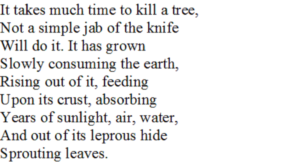

(i) Which poetic device has been used in the eighth line of the extract?
(ii) At what speed the tree grows?
(iii) Can a simple jab of knife kill a tree?
(iv) Which word of the extract mean ‘growing’?
(v) What does the tree absorb?
(vi) What word in the extract is synonymous to ‘skin’?
EB 2.
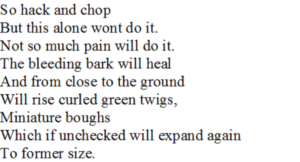

(i) Which two things alone cannot kill a tree?
(ii) Which word in the extract is antonym of ‘huge’?
(iii) Which poetic device has been used in the fourth line of the extract?
(iv) After cutting of a tree, what would rise again?
EB 3.
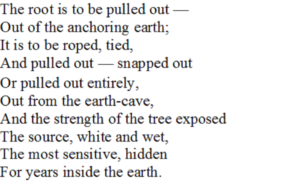

(i) What needs to be done to kill a tree?
(ii) How can roots be pulled out?
(iii) According to extract, how does the root appear ?
(iv) Which is the most sensitive part of the tree?
(v) Which word as used in the extract is antonym of ‘hidden’ ?
Short Answer Questions (30-40 words)


If these are not checked, the tree again grows to its former size.




If tree is uprooted, it will not grow again. Poet call this situation as killing of a tree.
****


0 Comments